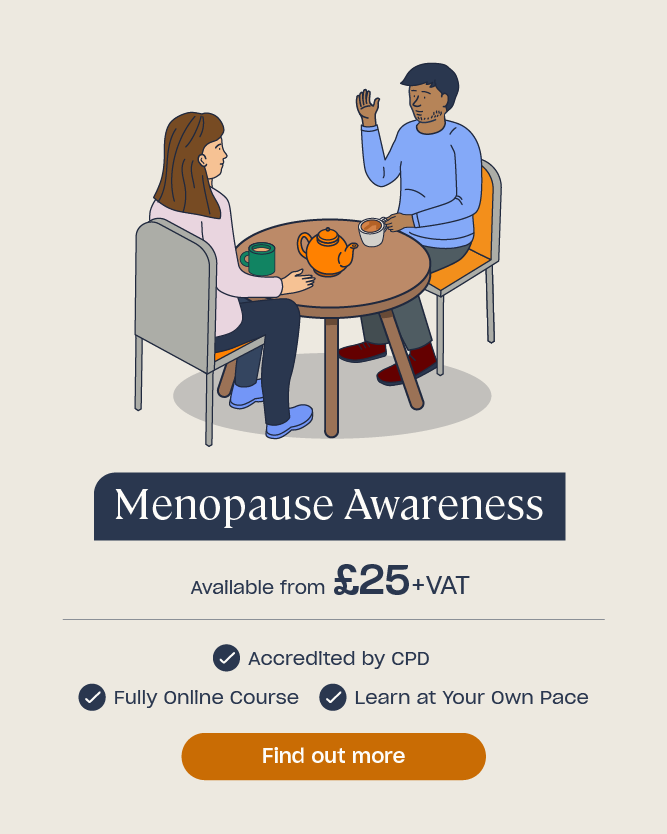How to Provide Menopause Support in the Workplace
Menopause is when a woman stops having menstrual periods, marking the end of fertility. This usually happens around the age of 45-55 when the ovaries no longer release an egg every month. During the menopause, people can experience a variety of symptoms that can have a huge impact on their lives both professionally and personally.
In this article, we will explain why an awareness of menopause is so important in the workplace and outline the impact it can have. We will also cover how employers can support their employees who are affected by the menopause.
In this article, we will refer to those experiencing menopause as women. However, we are aware that menopause directly affects everyone who has a menstrual cycle, including non-binary, intersex and trans people. We use the term women in line with a number of organisations that research and cover this topic. We seek not to generalise or diminish anybody’s personal experience and recognise that everybody’s symptoms and experiences of menopause are different.
Can Menopause Affect Work?
Menopausal women are the fastest growing demographic in the workforce. As a result, it is crucial that employers and managers increase their awareness of menopause and know how to support their staff appropriately.
Menopause can have a huge impact on a woman’s life. Through the symptoms experienced, the treatments needed and the way in which she may have to make changes to her life.
In the workplace, menopause can also have a significant impact. Some of the most commonly reported difficulties faced by women that are going through menopause are poor concentration, tiredness and a low mood. These symptoms, along with other associated factors such as working conditions, can have an effect on the quality and quantity of work done.

In addition, women have reported that they find managing their menopause symptoms very challenging when at work, especially as menopause is often not openly discussed. The physical symptoms, such as headaches, can cause women to take sick days and be absent from work. Other symptoms, for example anxiety and stress, can affect performance at work. However, it is important to note that menopause affects all women differently, so the symptoms experienced will differ between individuals.
As well as directly affecting the individual going through menopause, it can indirectly affect other employees, such as relatives, friends, carers or colleagues of someone going through menopause. Therefore, it should be considered an organisational issue.
Unfortunately, not everyone has a good understanding of menopause and there is a lot of false information and myths surrounding it. It is important that everyone understands menopause, as they will most likely be directly or indirectly affected by it at some point in their life.
Why is Menopause Awareness Important?
Having an awareness of menopause and understanding how it affects people will help you to support those experiencing it. Menopause can be daunting and can affect a woman in many different ways, therefore, knowing that people are there and wanting to offer help or support is very important.
Menopause is still considered a ‘taboo’ subject and is often overlooked. Research from Koru Kids has shown that 73% of menopausal women do not feel that they can openly discuss their symptoms and experience with colleagues.
Employees going through menopause are unlikely to discuss their experience with their manager as they may not feel comfortable talking about it. This is especially true if they believe there will be no benefit to doing so, such as nothing being done, or worse, being treated less favourably. Furthermore, it can be daunting speaking to someone about menopause when they have little, or no, understanding or awareness of it.

In the workplace, knowing how to support women going through menopause has a multitude of benefits, including:
- Preventing them from losing confidence in their abilities, from feeling like they need to take time off to hide that they’re going through menopause or even from leaving their job.
- Retaining employees that are going through menopause, which in turn reduces staff turnover.
- Improving overall morale as employees will feel more understood.
- Reducing absence days if flexible working arrangements are made. For example, if an employee doesn’t feel able to discuss their experience, they may feel they have no option but to take time off work.
- Encouraging an open culture of respect and support throughout the workplace.
- Increasing productivity because where employees are supported with reasonable adjustments, they can work more efficiently.
How to Support Menopause in the Workplace

Employers have a duty of care for all their employees. This is covered in various pieces of legislation, such as the Health and Safety at Work etc. Act 1974, Management of Health and Safety at Work Regulations 1999 and the Equality Act 2010. Under these regulations, employers must ensure the health and safety of all employees when they are at work, including employees going through menopause.
As mentioned, women going through menopause will experience a variety of symptoms that can affect them personally and professionally. To support women going through menopause in the workplace, there are a number of things that can and should be done.
Want to Learn More?
Our Menopause Awareness Training Course helps employers and employees develop their understanding of menopause and the impact it can have in the workplace. The course will equip you with the knowledge needed to apply best practice when supporting women experiencing menopause, along with optional additional training for managers.
Making reasonable adjustments to ensure that those going through menopause are supported and able to continue their work is crucial. It is also important to consider that menopause can have an impact on those supporting someone who is going through the menopause, as well as those experiencing it themselves.

To support employees going through menopause in the workplace, employers can:
- Offer flexible working arrangements, such as working from home or a space where they feel most comfortable.
- Offer flexible working hours so employees can attend doctor’s appointments. This could also include allowing additional breaks where required.
- Provide extra training, or specific meetings to educate employees about menopause and allow time to share tips for supporting each other.
- Provide a safe space and the opportunity for employees to discuss how they are feeling. The impact of good communication and listening should not be underestimated.
- Challenge the ‘taboo’ of menopause and encourage open discussion around it, as well as breaking down negative stereotypes.
- Provide a fan and/or move the employee to a desk near a window.
- Provide a uniform alternative to menopausal employees.
- Have regular check-ins or catch ups with the menopausal employee, if this is something they feel comfortable with, to see how they are and if they need any further support.
Another way employers can support employees affected by menopause is by creating a menopause policy. This could include what menopause is, how it can affect people and what support is available to employees that are affected by it. It could also explain the training provided to managers, the point of contact for any queries and how the organisation is committed to supporting employees.
Menopause is when a woman stops having menstrual periods, marking the end of fertility. This usually happens around the age of 45-55. In the workplace, menopausal women may need reasonable adjustments to be made so they can continue to work effectively. There are a multitude of benefits associated with encouraging a menopause friendly workplace, including improved staff morale, increased staff retention and an open, supportive work environment.
Further Resources:
- Menopause Awareness Training Course
- Myths and Facts About Menopause
- How to Improve Active Listening in Communication
- Workplace Health & Wellbeing Quiz







